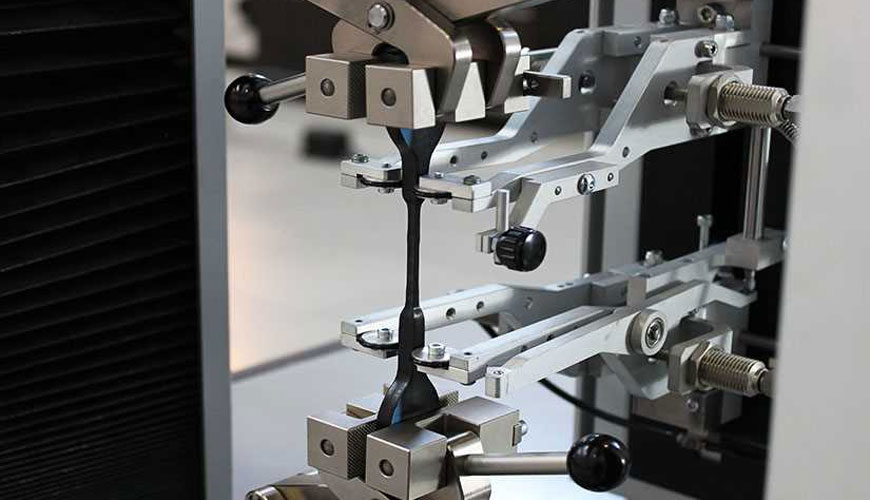

EUROLAB laboratory provides testing and compliance services within the scope of DIN 53504 standard. The DIN 53504 standard serves to determine the tensile strength at break, tensile stress at yield, elongation at break, and strain at a given strain of rubber test pieces of a given shape when stretched to break at a constant speed of transverse travel.

Since the behavior of rubber subjected to tensile stress cannot be adequately characterized by tensile strength at break and elongation at break, it is recommended to plot the full force-elongation curve, or at least part of it.
For tests to be carried out outside the ambient temperature, a thermostatically controlled led room will be installed on the tensile testing machine. The temperature in the chamber should be measured near the test piece and kept constant at ± 2 °C during the test.
For test rings, the testing machine must be equipped with one power driven and one freely rotating pulley. The distance traveled by the first would be approximately 50 mm for one turn. It will be possible to move the pulleys close enough together to allow the rings to be fitted without excessive force.
For testing dumbbells, the tensile testing machine must be equipped with two handles designed to align the longitudinal axis of the test piece at any time to coincide with the strain axis of the machine, which can be accomplished using a template. The dumbbell should be held in such a way as to prevent slipping relative to the handles as much as possible. Appropriate grips are those that maintain or even increase the pressure on the dumbbell as the stress increases. The handles must not cause premature tearing of the dumbbell l.
The testing machine should allow drawing both force-strain curves and stress-strain curves. The extensometer shall be capable of detecting the change in test length of the test piece at any time during the test and shall have as low inertia as possible. When using a test piece-connected extensometer instead of a non-contact extensometer, there should be no signs of damage to the test piece or any slippage between the extensometer grips and the test piece.
There is not yet a DIN Standard specifying the error limits for extensometers for measuring rubber and elastomers, as the apparent elongation of test pieces and the difficulty of fixing them securely means that existing extensometers do not meet the accuracy specifications given in DIN. EN ISO 527-1 and DIN EN ISO 5-4. For present purposes it is appropriate to adopt the error limits given in ISO 5893 (2%), it is the responsibility of the machine builder to specify the smallest value to which this value is valid.
The DIN 53504 test must be carried out at (23 ± 2) °C (referred to as ambient temperature below) or at one of the listed temperatures by agreement. Prior to testing, test pieces are conditioned for periods of at least 20 m at the test temperature. Testing shall not be less than 16 hours after curing and no less than 72 hours in arbitration cases.
Before testing, measure the test piece thickness at at least three points at ambient temperature, preferably within the initial test length L0 of the dumbbells at the two ends and center. Calculate the initial cross-sectional area from the median thickness of the die and the width of the narrow part (the distance between the cutting edges). In arbitration cases, the width of the narrow section is measured in accordance with DIN ISO 23529.
Among the services provided by our organization within the framework of material testing services, there are also DIN 53504 standard tests. Do not hesitate to contact our laboratory EUROLAB for your testing and certification requests.
To get an appointment, to get more detailed information or to request an evaluation, you can ask us to fill in our form and reach you.